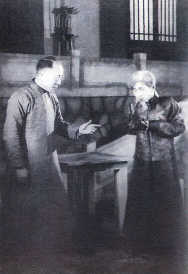Hong Shen and Zhang Pengchun had made indelible contribution to the establishment of modern Chinese director system. Prior to them, there was no director inChinawhen any play was staged.
After Hong Shen (1894-1955) joined in the Shanghai Drama Association, the first drastic measure he took was to implement a rehearsal system in order to standardize the actors' performance. Not only did he emphasize the importance of script but also defined the authoritative position of a director so as to seek uniformity between stage art design and the style of the script. At the same time, he required the actors to act out the characters' personalities and stressed cooperation between actors. A kind gentleman in daily life, Hong Shen was very serious and exacting when directing actors in repeated rehearsals and guiding them into the realm of artistic creation. In so doing, those who considered performance as something funny came to realize the difficulty of artistic conception.
The second radical measure Hong Shen took in the Shanghai Drama Association was to get rid of the customary practice of "man playing the female role" which was the result of the influence of Chinese feudal traditions.
 Zhang Pengchun (1892-1957) also promoted the establishment of the director system for modern Chinese drama. He was pursuing studies in theUSwhen the Little Theatre Movement was at its peak there. In 1916, he came back toChinaand was appointed deputy head of the Nankai New Drama Troupe. He practiced the director system in rehearsal. He was considered to have benefited a lot from Max Reinhardt, a famous German director and Gordon Craig, a well-known British director. He visitedRussiatwice and learned something from Stanislavski in performing theory. In the 1920s, he put on stage many European and American plays in a planned way, such as Ibsen'sA Dolls HouseandAn Enemy of the People. In addition, he adapted John Galsworthy'sStrifeintoStruggling for Power, Moliere'sL' avare(The Miser) intoThe Skinflintand Gogol'sThe General InspectorintoThe Imperial Envoy.All these made him famous in the dramatic circle of the time and the plays he directed were very popular in the area surrounding BeijingandTianjin.
Zhang Pengchun (1892-1957) also promoted the establishment of the director system for modern Chinese drama. He was pursuing studies in theUSwhen the Little Theatre Movement was at its peak there. In 1916, he came back toChinaand was appointed deputy head of the Nankai New Drama Troupe. He practiced the director system in rehearsal. He was considered to have benefited a lot from Max Reinhardt, a famous German director and Gordon Craig, a well-known British director. He visitedRussiatwice and learned something from Stanislavski in performing theory. In the 1920s, he put on stage many European and American plays in a planned way, such as Ibsen'sA Dolls HouseandAn Enemy of the People. In addition, he adapted John Galsworthy'sStrifeintoStruggling for Power, Moliere'sL' avare(The Miser) intoThe Skinflintand Gogol'sThe General InspectorintoThe Imperial Envoy.All these made him famous in the dramatic circle of the time and the plays he directed were very popular in the area surrounding BeijingandTianjin.
Now let us consider features of Zhang Pengchun's directing. First, he required the actors to make a full desktop preparation, i.e. to gain a deep understanding and study of both the script and the writer. Second, he was a stickler in rehearsal, demanding the actors to act on the director's instructions, their speaking and activities on the stage should be done according to the director's directions and no offhand performance was allowed. Third, he paid as much attention to applying theories as to the artistic conception of Chinese poetry andCiin rehearsal.
Another contribution made by Zhang Pengchun as a director rests with his success in fostering such famous playwrights as Cao Yu, Zhang Pingqun and Jin Yan.
